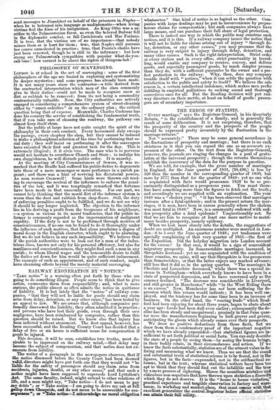PHILOSOPHY OF SCAVENGING.
LONDON is at school in the art of scavenging : some of the first philosophers of the age are busied in exploring and systematizing rts deeper mysteries ; and some progress has already been made. It is not many years since the contractor—a title derived from the contracted interpretation which men of the class commonly give to their duties—could not be made to recognize snow as
t or rubbish to be removed; from its not being a commodity contractorially valuable. Now, the City authorities are actively
in considering a comprehensive system of street-cleaning ei er by " street orderlies" or on the ordinary plan ; the critical question being that of expense. Meanwhile, Charles Cochrane has dune his countrythe service of establishing the fundamental truth, fhat if you take care of cleaning the roadway, the pathway can almost keep itself clean. Brit the public at large have not quite caught the spirit of the plulosophy in their own conduct. Every housemaid dulysweeps the passage, every shopboy the shop, but they cannot be induced to make a philosophical selection of the time for performing that so- cial duty ' - they tag/ insist on performing 'it after the scavengers have executed their first and greatest tusk for the day. This is extremely illogical ; it it civic vice. The man who is so perverse would not hesitate 'to overthrow Church and State ; to indulge his own sluggishness, he will disturb public order. It is anarchy. At the meeting of City -Commissioners of Sewers, it was re- marked that the Beadle had suffered his public duties to degenerate into those ef a mere messenger or mere performer in a parish pa- geant ; and there was a hint of reviving his dictatorial powers. As soon restore Cromwell Some hints were thrown out tend- ing to encourage the revival of the informers to enforce the penal- ties of the law, and it was temptingly remarked that fortunes have been made in that unseemly avocation. For our part, we cannot help thinking that the moral dirt of the informer system is worse than the dust and rubbish from shop-floors. Still, the duty of enforcing penalties ought to be fulfilled, and we do not see why it should be any longer neglected. "The objection to the informer lies in his deriving a profit from the trespasses of his neighbours, —a system so vicious in its moral tendencies, that the public in- former is commonly regarded as the impersonation of malignant cupidity. If the duty is not to 'be performed through motives of conscientiousness, If no one can be found to do it thoroughly under the influence of such motives, that fact alone proclaims a degree of moral decay in the English character, -which ought to be alarming. But we do not believe in any such impossibility. We'believe that if the parish authorities were to look out for a man •of the indus- trious class, known not only for his personal efficiency, but also km manliness and conscientiousness, they might find such a man in any parish ; to whom liberal wages and the honourable desire to fulfil the 'duties set down for him would be quite sufficient inducement. The example of such an appointment, and -of such conduct, might have cleansing effects beyond the merely material scavenging.


























 Previous page
Previous page